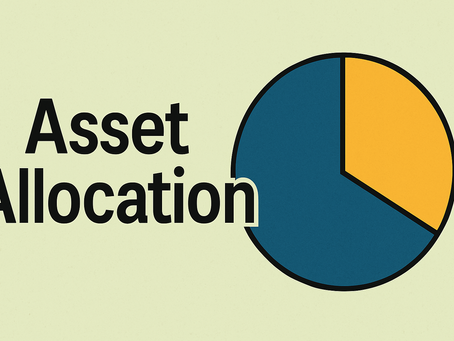top of page

Blog


Financial Word of the Day: Momentum Strategy
Momentum Strategy is a simple but powerful investing concept built on one core idea:assets that have been performing well tend to keep performing well—at least for a period of time.
Instead of trying to predict what might do well next, a momentum strategy focuses on what’s already working and rides that trend until the momentum fades.
This approach isn’t flashy. It’s disciplined. And when used wisely, it can help investors avoid emotional decision-making and align their mon

Larry Jones
Jan 62 min read


Financial Word of the Day: Contrarian Strategy
Definition of Contrarian Strategy
A Contrarian Strategy is an approach to investing (and decision-making) where you intentionally go against the prevailing market sentiment. When most people are optimistic and buying aggressively, contrarians get cautious. When most people are fearful and selling, contrarians start looking for opportunities.
At its core, a contrarian strategy assumes that markets often overreact—both on the upside and the downside...

Larry Jones
Jan 52 min read


Financial Word of the Day: Seasonal Investing
A Simple Definition of Seasonal Investing
Seasonal Investing refers to investing strategies that take advantage of recurring calendar-based trends in the financial markets.
These trends can be monthly, quarterly, or tied to specific parts of the year — like holidays, earnings seasons, or even weather patterns.
A classic example is the saying, “Sell in May and go away,” which reflects the historical tendency for stocks to underperform during the summer months...

Larry Jones
Jan 22 min read


Financial Word of the Day: Sector Rotation
Definition of Sector Rotation
Sector Rotation is an investment strategy that involves shifting money between different sectors of the economy—such as technology, healthcare, energy, or consumer goods—based on where we are in the economic or market cycle. The idea is simple: different sectors tend to perform better at different times.
In other words, not all parts of the market lead at the same time. Smart investors pay attention to where the momentum is moving next...

Larry Jones
Jan 12 min read


Financial Word of the Day: Relative Strength
Definition of Relative Strength
Relative Strength is a way to compare the performance of one investment to another—most commonly against the overall market or a benchmark like the S&P 500. Instead of asking, “Is this investment going up?” relative strength asks the better question: “Is this investment performing better or worse than something else?”
That subtle shift matters more than most people realize.
An investment can be rising in price and still be a poor performer..

Larry Jones
Dec 31, 20252 min read


Financial Word of the Day: Mean Reversion
The Definition of Mean Reversion
Mean Reversion is the concept that over time, prices, returns, or performance tend to move back toward their long-term average—or “mean.”
In plain English: What goes up too far usually comes back down.What goes down too far often comes back up.
Markets don’t move in straight lines forever. They swing. They overshoot. Then they correct.

Larry Jones
Dec 29, 20252 min read


Financial Word of the Day: Window Dressing
What Is Window Dressing?
Window dressing is the practice of making financial statements, investment portfolios, or business results look better than they really are—usually right before they’re reviewed by outsiders.
It’s not always illegal. But it’s often misleading.

Larry Jones
Dec 26, 20252 min read


Financial Word of the Day: Santa Claus Rally
What Is a Santa Claus Rally?
A Santa Claus Rally refers to the historical tendency for the stock market to rise during the final trading days of December and the first couple of trading days in January. Traditionally, this period includes the last five trading days of the year and the first two trading days of the new year.
In plain English: stocks often get a late-December boost—right when people are hanging lights, wrapping gifts, and eating one too many cookies.

Larry Jones
Dec 25, 20252 min read


Financial Word of the Day: Halloween Effect
Definition of Halloween Effect
The Halloween Effect (sometimes called Sell in May and Go Away) is a market anomaly that suggests stocks tend to perform better during the six-month period from November through April than they do from May through October.
In plain English: historically speaking, the market has often delivered stronger returns in the “winter” months than in the “summer” months.

Larry Jones
Dec 24, 20252 min read


Financial Word of the Day: Anchoring
A Simple Definition of Anchoring
A behavioral bias where we fixate on an initial price, value, or piece of information and use it to make ongoing decisions—often leading to bad financial choices.

Larry Jones
Nov 28, 20252 min read


Financial Word of the Day: Overconfidence
Definition of Overconfidence
Overconfidence (in finance) is a behavioral bias where investors believe they have better knowledge, sharper instincts, or more accurate predictions than they actually do. This confidence leads them to take bigger risks, ignore danger signs, and make decisions based on gut feelings instead of solid strategy.

Larry Jones
Nov 27, 20252 min read


Financial Word of the Day: Herding
Definition of Herding
Herding is when investors blindly follow what everyone else is doing instead of making decisions based on actual research, fundamentals, or strategy. It’s jumping into the market simply because “everybody’s buying” or dumping your investments just because “everyone is selling.”

Larry Jones
Nov 26, 20252 min read


Financial Word of the Day: Efficient Market Hypothesis
Definition of Efficient Market Hypothesis (EMH)
The Efficient Market Hypothesis (EMH) says this: All publicly available information is already baked into current stock prices — instantly.
In other words, you can’t consistently “out-smart” the market by finding hidden gems, secret tips, or under-the-radar opportunities… because the market has already priced those in. Like, immediately.
According to EMH, the only way to beat the market is by taking more risk — not by being s

Larry Jones
Nov 20, 20252 min read


Financial Word of the Day: Asset Allocation
What Is Asset Allocation?
Asset allocation is the strategy of dividing your investments across different “buckets” — typically stocks, bonds, and cash — based on your goals, your time horizon, and how much risk you can stomach without losing sleep or stress-eating Chips Ahoy at midnight.
Think of it like building a balanced meal.
Stocks = protein
Bonds = veggies
Cash = carbs

Larry Jones
Nov 18, 20252 min read


Financial Word of the Day: Rebalancing
What Is Rebalancing?
Rebalancing is the periodic process of adjusting your investment portfolio back to its original target mix. In plain English: the market shifts, your allocations drift, and you move things around to get everything back where it’s supposed to be.
If your plan says 70% stocks and 30% bonds, but stocks had a monster year and now you’re sitting at 82/18, rebalancing is the reset button.

Larry Jones
Nov 17, 20252 min read


Financial Word of the Day: Dollar Cost Averaging (DCA)
Definition of Dollar Cost Averaging
Dollar Cost Averaging (DCA) is an investing strategy where you invest a fixed amount of money at regular intervals—say, every week or every month—regardless of whether the market is up or down. Over time, this approach smooths out your purchase price and reduces the risk of buying everything at the market’s peak.

Larry Jones
Nov 14, 20252 min read


Financial Word of the Day: Buy and Hold
Definition of Buy and Hold
Buy and Hold is a long-term investment strategy where an investor purchases assets—typically stocks, ETFs, or index funds—and holds them for an extended period, regardless of market fluctuations. The idea is simple: time in the market beats timing the market. Instead of jumping in and out based on daily trends or short-term news, the buy-and-hold investor focuses on the long-term growth of their investments.

Larry Jones
Nov 13, 20252 min read


Financial Word of the Day: Momentum Investing
Definition of Momentum Investing
Momentum investing is an investment strategy where investors buy assets that have shown strong recent performance and sell those that have shown weak performance. It’s based on the idea that rising stocks often keep rising for a time, and falling stocks often keep falling, because of market psychology and herd behavior.

Larry Jones
Nov 12, 20252 min read


Financial Word of the Day: Growth Investing
Definition of Growth Investing
Growth investing is a strategy focused on buying shares of companies that are expected to grow faster than the overall market. These companies typically reinvest their profits back into expansion—through new products, technology, or market share—rather than paying dividends to shareholders. The goal? Long-term capital appreciation.

Larry Jones
Nov 10, 20252 min read


Financial Word of the Day: Value Investing
Definition of Value Investing
Value investing is a long-term investment strategy focused on buying stocks (or other assets) that appear to be undervalued by the market. In plain English, it means finding strong companies selling for less than they’re truly worth—and holding them until their true value is recognized.

Larry Jones
Nov 7, 20252 min read
bottom of page